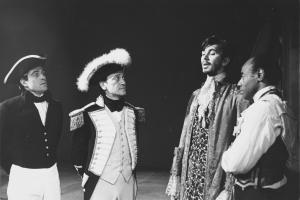The Underground Railroad’s Stealth Sailors
The New York Review of Books
 The war ended in October 2011. US and European aircraft attacked Qadhafi’s convoy, and he was brutally murdered by extremist rebels. The government soon dissolved.
In the six years since, Libya has been roiled by chaos and bloodshed. Multiple would-be governments are competing for control of the oil-rich country, and in some areas there is still no functioning central authority. Many thousands of people have died, although the true numbers are impossible to verify.
The war ended in October 2011. US and European aircraft attacked Qadhafi’s convoy, and he was brutally murdered by extremist rebels. The government soon dissolved.
In the six years since, Libya has been roiled by chaos and bloodshed. Multiple would-be governments are competing for control of the oil-rich country, and in some areas there is still no functioning central authority. Many thousands of people have died, although the true numbers are impossible to verify.
 As more and more settlers arrived in the English colonies, the property they owned north and south increasingly took the human form of African slaves, encouraging the credo that freedom for some required the enslavement of others. The books under review exhaustively cover the early slavery period, where even the Puritan ideal of a city on a hill actually rested on the backs of numerous enslaved and colonized people.
As more and more settlers arrived in the English colonies, the property they owned north and south increasingly took the human form of African slaves, encouraging the credo that freedom for some required the enslavement of others. The books under review exhaustively cover the early slavery period, where even the Puritan ideal of a city on a hill actually rested on the backs of numerous enslaved and colonized people.
Spread the word